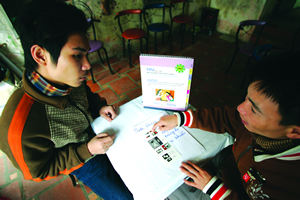Earlier Treatment Saves Lives
Recent Study Influences WHO Recommendations on ART

A treatment educator in Viet Nam discusses
medication choices. (Photo: Karl Grobl) |
October 2010—In July 2010, the World Health Organization (WHO) revised its antiretroviral therapy (ART) guidelines for adults and adolescents, which now recommend starting ART when a patient's CD4 count drops below 350 cells/ml3. Earlier WHO guidelines had set the threshold at 200 cells/ml3.
A study conducted in Haiti on when to start ART provided key evidence for the revised recommendation.1 Researchers from the Haitian Group for the Study of Kaposi's Sarcoma and Opportunistic Infections (GHESKIO) conducted a randomized trial in Port au Prince on the timing of ART initiation. Participants were enrolled in two groups based on their baseline CD4 count. The first group had CD4 levels between 200 and 350 cells/ml3, and the second had CD4 levels below 200 cells/ml3. A total of 816 participants (58 percent female) whose median CD4 count was 281 cells/ml3 were followed for a median of 21 months between 2005 and 2008. Follow-up was conducted on a monthly basis by a clinician.
Trimethoprim-sulfamethoxazole (also known as cotrimoxazole) was provided to all participants to prevent pneumonia, and isoniazid was given to those with positive tuberculosis skin tests. Adherence questionnaires were completed every six months.
The study showed a 75 percent decrease in deaths and a 50 percent decrease in the incidence of tuberculosis among those who started ART when their CD4 count was between 200 and 350 cells/ml3 compared to those who waited until their CD4 count was below 200 cells/ml3.
These results validate findings from other observational studies on when to start ART, including those described in the March 2009 and July 2009 issues of the TREAT Asia Report. The reduction in tuberculosis is also consistent with observational studies conducted in Africa.
The results of this clinical trial point to the urgent need to improve access to HIV testing and treatment in resource-limited settings. While the financial implications of treating larger numbers of people continue to raise concerns among donors and policy makers, this study clearly demonstrates the short- and long-term clinical benefits of starting treatment earlier. WHO's revised global treatment guidelines underscore the urgency of overcoming the barriers to treatment access.
1. Severe P, et al. Early versus standard antiretroviral therapy for HIV-infected adults in Haiti. New England Journal of Medicine. 2010 July 15; 257–265.